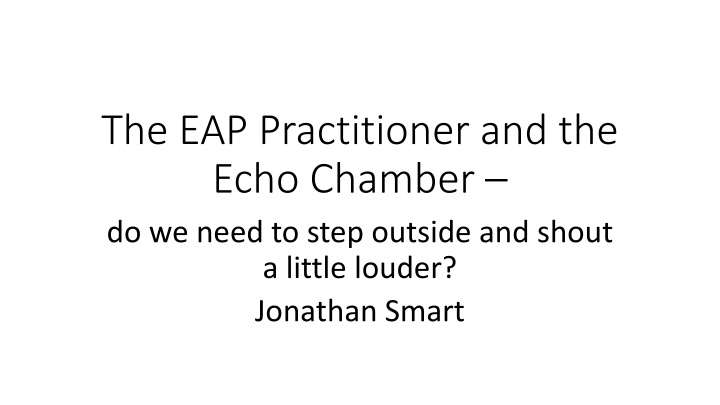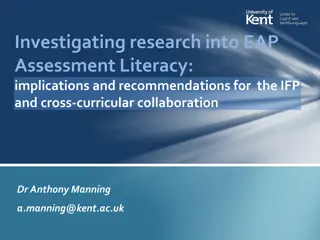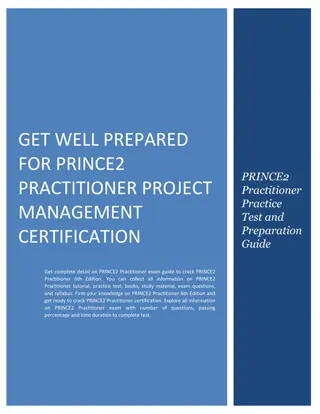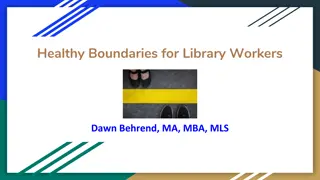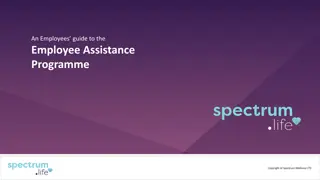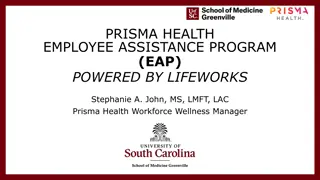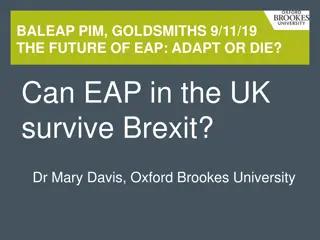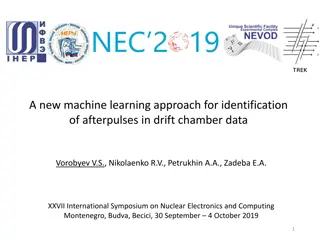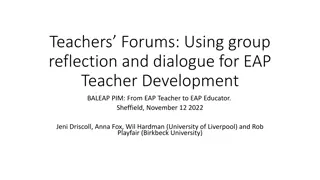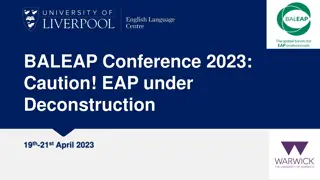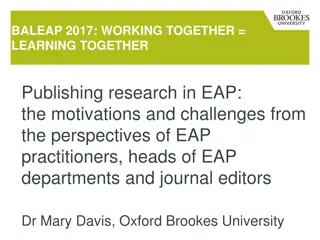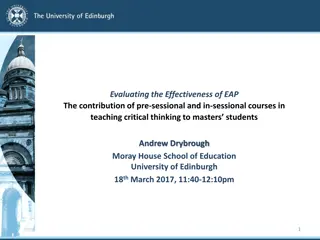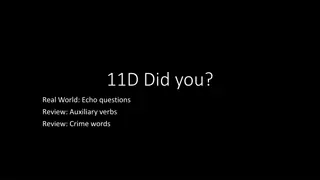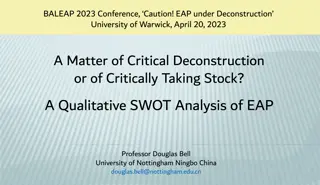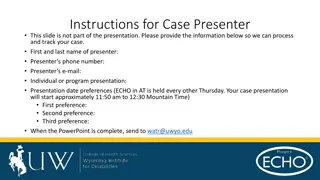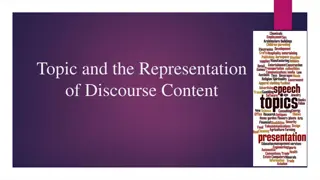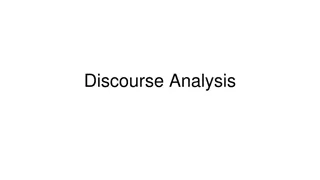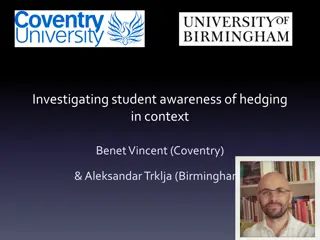EAP Practitioner's Echo Chamber: Breaking Boundaries in Academic Discourse
Explore the concept of echo chambers in the EAP practitioner community, addressing issues of identity, language reinforcement, and the need to break away for growth. Delve into overcoming the Cinderella status of EAP within academic institutions to elevate its recognition and value.
Download Presentation

Please find below an Image/Link to download the presentation.
The content on the website is provided AS IS for your information and personal use only. It may not be sold, licensed, or shared on other websites without obtaining consent from the author.If you encounter any issues during the download, it is possible that the publisher has removed the file from their server.
You are allowed to download the files provided on this website for personal or commercial use, subject to the condition that they are used lawfully. All files are the property of their respective owners.
The content on the website is provided AS IS for your information and personal use only. It may not be sold, licensed, or shared on other websites without obtaining consent from the author.
E N D
Presentation Transcript
The EAP Practitioner and the Echo Chamber do we need to step outside and shout a little louder? Jonathan Smart
Outline: What we mean by echo chamber in this context EAP practitioner baggage relevance to the echo chamber EAP practitioner as auslander How language and terminology reinforces image and identity Parallels with other professional groups within H.E. Consequences the retreat to the echo chamber Reference to feedback from 2017 survey
To exist in an echo chamber and only talk to people with whom we agree is fruitless Tomi Lahren
One definition any situation in which information, ideas or beliefs are amplified or reinforced by transmission inside an enclosed space Potter (2010)
By the end of this presentation 1. Do you recognise the echo chamber concept as applied to EAP? 2. If so, what is / would be your own personal formula for breaking out of that echo chamber?
EAP: a sort of Cinderella status (Sharpling 2002; Turner 2004, 2012; Charles & Pecorari 2016; Ding & Bruce 2017)
Definition of Cinderella 1. a woman who achieves fame after being obscure 2. a. a poor, neglected, or unsuccessful person or thing [a poor relation ] b. (as modifier) a Cinderella service that's been denied funding 3. (modifier) relating to dramatic success a Cinderella story Return
in many institutions EAP has a sort of Cinderella status and staff do less well in terms of salary, opportunities to research and other benefits than staff in other subjects (Charles and Pecorari 2016) regenerating it [EAP] from a Cinderella subject to one which is fully worthy of consideration as an academic discipline (Sharpling 2002) associated with: the lack of prestige or status often accorded to academics based in central or faculty university units rather than teaching departments (McCulloch 2018)
EAP practitioner - Identity and image Marginalised(e.g. Turner 2004; Stevenson 2007) Peripheral to academia (Ding and Bruce 2017) Outsider status (Hyland 2012) - auslanders Handmaidens (Hyland 2014) Butlers (Raimes 1991) Servicing disciplines, faculties and departments (Barron 1992, 2002) Return
Survey interviewees (2017) At worst one was treated as a rather superior version of a cleaner I think they think of us as remedial large numbers of our colleagues are on employment terms rather like nineteenth century mill-hands [Career progression] compares unfavourably with other academics on the whole I think our status is very ambivalent I don t think they [subject tutors] really knew what EAP was for I think they think of us as remedial [communications issue?]
Mind your language? Support ( support eschewed by Masterson & LD) Training (objectivist - Skinner) circus? Servicing (boiler?) Denies notion of EAP being academic, educational, transformative (irony?), constructivist (Vygotsky) unlike disciplinary teaching C.f. Bibliographic instruction Their lack of status is reflected in the language used to describe their positioning in the academic world (Strauss 2013: 2)
Institutional perspectivesreinforce EAP s lack of recognition as discipline Remedial / deficit model Marketisation (macro-effect on H.E.) Collocation with non-academic functions Lack of agency
Managerial clichs aid acceptance When the wind blows, some people build walls, others build windmills Challenges not problems Have to do more with less Lemons Why are we so accepting even complicit?
Causal outcomes? What are the likely consequences of lack of recognition and marginalisation? Perceived as attack on ID & professionalism
Welcome to the echo chamber Shared issues: EAP practitioners, Information Professionals & LD back Bundy (2004); silos - talking to the converted; Where are the subject specialists? Echo chamber pejorative, but comforting: It s cosy in here (Wiseman 2016) .and what about CoPs? But ..
Synthesis (new level of understanding) Thesis (argument) Antithesis (counter-argument) Dialectic (Hegel)
Echo chamber / CoP Circular non-progressive arguments tribal reverb ns Dissent likely to be absorbed Inclusive to their own de facto excludes outsiders Group is insulated insularity They stayed separate, kept their rituals, preserved their culture, and protected themselves. Identity in foreign land EAP - lack of agency colluded in its own marginalisation (Turner 2004: 96)
Breaking out of the Echo Chamber(?) Collaboration Holy Grail (Dudley-Evans & St John 2012; Flowerdew & Peacock 2001; Hyland 2006,2014 etc.) Change of mindset political savviness, play the game Learn the discourse deploy it as part of the tribe Effective self-marketing talk up successes Realpolitik alliances, champions Collaborative conference papers, HEA / Advance H.E. The Neil Effect importance of shared agenda (language / content)
Breaking out of the Echo Chamber (cont.) Involvement with faculty meetings represents opportunities esp., e.g., T & L committees 1. One of theirs confidante (periphery advantage) 2. Can learn and be part of the political dialogue 3. Forge (influential) alliances 4. Meeting-savvy - advance prep + raise awareness
Shouting a little louder? academic success is rarely attributed to good language use (Turner 2004: 99) establish link? Challenge technicist discourse around language- learning (Turner 2004; Hadley 2011) Inseparability between subject content and language (Gustaffson et al. 2015; Al-Maamari 2016; Lee 2009) leads to Establishing and marketing connection between EAP and academic success HEA/Advance H.E.?
Concluding remarks and prognosis Comfort zones - do we really want to move out? (Strauss 2013) Cinderella status fame after obscurity; dramatic success EAP s aspiration? Back I think that it [EAP] is seen as remedial, but this is starting to change (survey interviewee) EAP must be convinced of its own status (otherwise self-fulfilling prophesy) comfortable in its own skin, not only to step out of its own echo chamber but to have confidence to step into others and sell itself effectively.
References Al-Maamari, F. (2016) Programme Identity in Academia: The Case of One EAP Unit in the Arabian Gulf. AWEJ [online] 7(3): pp. 425-444. Available at: https://www.researchgate.net/publication/314468936_Programme_Identity_in_Academia_The_Case_of_O ne_EAP_Unit_in_the_Arabian_Gulf [Accessed 8th April 2019]. Barron, C. (1992) Cultural syntonicity: co-operative relationships between the ESP unit and other departments. Hongkong Papers in Linguistics and Language Teaching, [online] 15: pp. 1-14. Available at: http://files.eric.ed.gov/fulltext/ED355766.pdf [Accessed 9th April 2019]. Barron, C. (2002) Problem-solving and EAP: themes and issues in a collaborative teaching venture. English for Specific Purposes [online]22:3:pp. 297-314. Available at: http://www.sciencedirect.com/science/article/pii/S0889490602000169 [Accessed 8th April 2019]. Bundy, A. (2004) Beyond information: the academic library as educational change agent. 7th International Bielefeld Conference [online] pp. 1-13. Available at: http://conference.ub.uni- bielefeld.de/2004/proceedings/bundy_rev.pdf [Accessed 9th April 2019].
References Charles, M. & Pecorari, D. (2016) Introducing English for academic purposes. Oxford: Routledge. Ding, A. & Bruce, I. (2017) The English for academic purposes practitioner: operating on the edge of academia. Palgrave Macmillan. Dudley-Evans, T. & St John, M. (2012) Assessment: Continuous assessment and testing. In Developments in English for specific purposes. Cambridge: Cambridge University Press ELT. Flowerdew, M. & Peacock, M. (ed.) (2001) Research perspectives on English for academic purposes. Cambridge, UK: CUP. Gustaffson, M. et al. (2011) Collaborating for content and language integrated learning: The situated character of faculty collaboration and student learning [online]. Available at: http://digitalknowledge.cput.ac.za/bitstream/11189/4925/3/Gustafsson_M_Eriksson_A_R%C3%A4i s%C3%A4nen_C_Stenberg_AC_Jacobs_C_Wright_J_Wyrley- Birch_B_Winberg_C_Health%20%26%20Well_2011.pdf.pdf [Accessed 9th April 2019] Hyland, K. (2006) English for academic purposes: an advanced resource book. Oxford, UK: Routledge.
References Hyland, K. (2012) The past is the future with the lights on: Reflections on AELFE s 20th birthday. Ib rica [online] 24(24): pp. 29-42.Available at: https://scholar.google.co.uk/scholar?q=hyland+the+future+is+with+lights&btnG=&hl=en&as_sdt=0 %2C5 [Accessed 9th April 2019]. Hyland, K. (2014) Re-imagining literacy: English in Hong Kong s new university curriculum. English Language Education and Assessment. Springer Singapore: pp. 139-151. Available at: https://www.researchgate.net/profile/Ken_Hyland/publication/289315441_Re- imagining_Literacy_English_in_Hong_Kong's_New_University_Curriculum/links/5697a80b08aec79e e32b3d47.pdf [Accessed 9th April 2019]. Masterson, D. & Kosinska, A. (2014) Connecting language with subject content (Encouraging students to form a triangular relationship with a language tutor and a subject specialist). Presented at Plymouth University, UK, 27 June 2014. Lee, C. (2009) Promoting interdisciplinary collaboration: three case studies. HKBU Papers in Applied Language Studies [no longer available electronically] McCulloch, A. (2018) The disciplinary status of doctoral education. Available at: https://s3.amazonaws.com/academia.edu.documents/57819970/McCulloch_2018_HER.pdf?AWSAc cessKeyId=AKIAIWOWYYGZ2Y53UL3A&Expires=1554894367&Signature=XIBi2ssBFXMnBz8nMMgdR 7Qp%2F2A%3D&response-content- disposition=inline%3B%20filename%3DThe_disciplinary_status_of_doctoral_educ.pdf [Accessed 9th April 2019] Potter (2010) Escaping the echo chamber. Presentation at City Business Library, London. Available at: https://prezi.com/if9wccvvunup/escaping-the-echo-chamber/ [Accessed 9.4.2019]
References Sharpling, G.P. (2002) Learning to teach English for academic purposes: some current training and devel9pment issues. ELTED [online] 6 (Summer): pp. 82-94. Available at: http://wrap.warwick.ac.uk/3252/1/WRAP_Sharpling_V6Sharpling.pdf [Accessed 6th April 2019]. Stevenson, M. & Kokkinn, B. (2007) Pinned to the margins? The contextual shaping of academic language and learning practice. Journal of academic language and learning, 1(1), pp.A44-A54. Available at: http://journal.aall.org.au/index.php/jall/article/viewArticle/38 [Accessed 9.4.2019] Strauss, P. (2013) I don t think we re seen as a nuisance : the positioning of postgraduate learning advisors in New Zealand universities. TEXT Journal of Writing and Writing Courses [online] Available at: https://openrepository.aut.ac.nz/handle/10292/10239 [Accessed 9.4.2019] Turner, J. (2004) Language as academic purpose. Journal of English for Academic Purposes [online] 3: pp. 95-109. Available at: http://www.sciencedirect.com/science/article/pii/S1475158503000547# [Accessed 9th April 2019]. Turner, J. (2012) Academic literacies: Providing a space for the socio-political dynamics of EAP. JEAP 11, 17-25. Available at: https://www.sciencedirect.com/science/article/pii/S1475158511000828 [Accessed 9.4.2019] Wiseman, E. (2016) Get out of my echo chamber. It's cosy in here. Guardian [online] 11.12. Available at: https://www.theguardian.com/lifeandstyle/2016/dec/11/get-out-of-my-echo-chamber-its-cosy-in- here [Accessed 9.4.2019]
